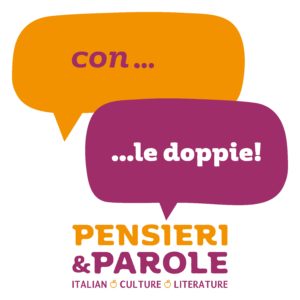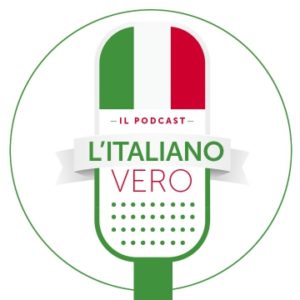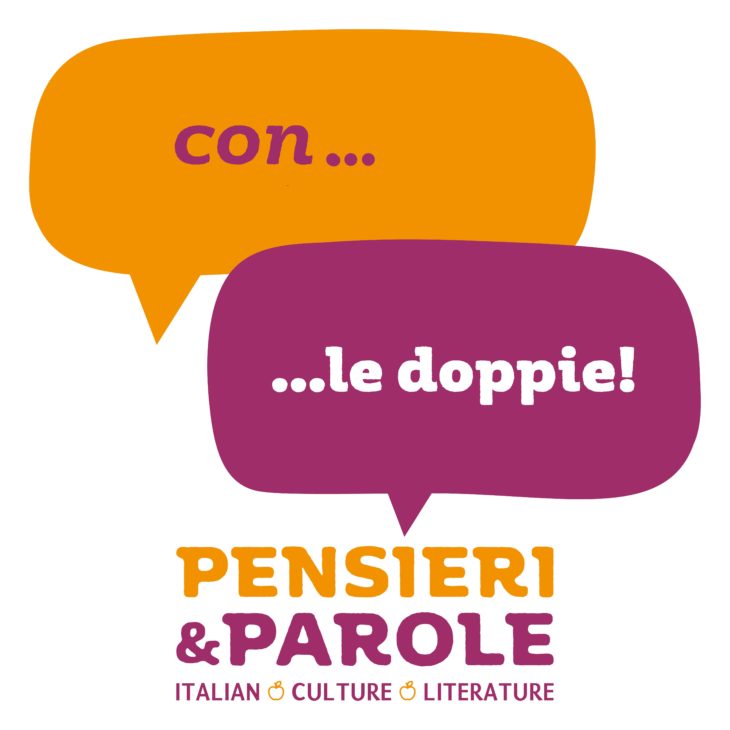
Blog in italiano – tempo di lettura: 4.5 min
Blog in English – reading time: 4.5 min
Esercitati🏋 con il nostro <Quizlet>
Episodio con sottotitoli e trascrizione disponibile: clicca<qui>
________________
Blog in italiano
Oggi i nostri eroi Cubo e Paolo, raccogliendo il gradito suggerimento di Elena, una nostra patron, si cimentano con la grammatica (ecco perché eroi…) e ci parlano dell’uso delle doppie, spesso ostiche anche per noi italiani! Per farlo hanno chiesto aiuto a Michela che da brava insegnante dissolverà i loro dubbi e a Linda la nostra amica podcaster di “Pensieri e Parole” alla quale dedichiamo il titolo dell’episodio.
Cominciamo con il rassicurarvi nel dire che non solo gli stranieri, ma molti italiani veri sbagliano o hanno dubbi sull’uso delle doppie e non solo gli studenti di Michela!
E questo perché la grammatica italiana per ogni regola prevede molte eccezioni! Nel caso dell’uso delle doppie ricorderemo le regole più semplici senza addentrarci troppo nelle complesse spiegazioni della fonetica, con il consiglio di affidarvi al vostro buon orecchio!
La regola maestra è infatti certamente quella dell’ascolto. Provare a pronunciare una parola ad alta voce ci aiuta moltissimo a capire come scriverla e se ci resta il dubbio possiamo ricorrere al dizionario!
Ma prima di entrare in argomento, lasciamo a Cubo il tempo per la sua consueta freddura con risvolto istruttivo, dice lui…: visto che è single, non ha mogli o fidanzate con cui litigare, ha un rapporto tutto suo con la tecnologia e con la sua fedele stampante con la quale si è trovato a litigare e a dirle di abbassare il “toner”! (gioco di parole basato sull’assonanza tra toner e tono).
Ecco ora abbiamo proprio voglia di studiare grammatica!
Perché le doppie sono importanti?
Per capire e farsi capire bene nella comunicazione, e una consonante doppia mancata o di troppo può cambiare il significato di una parola, pensiamo a pala e palla, casa e cassa, tori e torri, capello e cappello, notte e note… e si possono perciò generare fraintesi.
Vero, Cubo? Prontamente Cubo, che ha a cuore i suoi ascoltatori e vuole evitare loro brutte figure, ci mette in guardia citando pene e penne, ano e anno, cane e canne…
(A proposito della parola gergale canne, intesa come spinello, anche se non esiste un’etimologia chiara di questa parola, secondo alcuni potrebbe derivare dalla canna da pesca per la sua caratteristica forma stretta e lunga, o magari come dice Paolo da Cannabis.)
E’ quindi davvero sull’ascolto che si gioca la corretta pronuncia.
Ascoltando una parola che contiene una doppia, notiamo che la vocale prima della consonante doppia è più corta: la O di copia è più lunga della O di coppia dove la o è brevissima; la A di fato è più lunga della la A di fatto. La E di ecco è più breve della E di eco e via di seguito…
Ma anche qui non è detto che la pronuncia si rispecchi sempre nella grafia: infatti molte consonanti iniziali di parola precedute da parole che terminano con vocale, si pronunciano come se fossero doppie (a me suona ammé) ma nella scrittura restano non raddoppiate a meno che le due parole si scrivano unite (affianco invece di a fianco).
Per esempio, nei dialetti centromeridionali, il raddoppiamento è fatto risaltare nella pronuncia anche laddove non c’è il raddoppio, soprattutto con le consonanti bilabiali come la B o la P cioè le consonanti che per essere pronunciate prevedono la chiusura delle labbra, pensiamo a “roba” che al sud è pronunciata “robba”, o al nostro Cubo che quando va trovare i cugini ad Avellino diventa per tutti CuBBo.
Non ci sono delle vere e proprie regole universali ma in generale, possiamo dire che le parole formate da un prefisso + una parola completa, spesso raddoppiano la consonante della seconda parola: e+pure: eppure, ne+meno: nemmeno, se+bene: sebbene, sopra+nome:soprannome, sopra+tutto:soprattutto, così+detto:cosiddetto.
Ovviamente parliamo di parole composte da un prefisso, perché questa regola non vale per tutte le parole composte, anzi! (vedi sottotetto, battiscopa, francobollo, fotoritocco,sottoscala, e chi più ne ha più ne metta!).
Ci sono poi anche regole sul non raddoppiamento, ad esempio i gruppi di parole con -zion, -gion e -bil non raddoppiano mai il suono iniziale ad eccezione di loggione (parte più alta del teatro): questa, infatti, va scritta con due g. Potete approfondire l’argomento qui:
Z O ZZ? ECCO COME NON SBAGLIARE PIÙ CON LA ZETA
Un’altra regola riguarda le parole che contengono le sillabe zio, zia, zie che non vogliono il raddoppio della z (concezione, produzione, accettazione) ma anche qui ci sono eccezioni (razzia, pazzia). Per svelare l’arcano, di tutte queste eccezioni serve ricordare che la lingua italiana è figlia del latino e del greco, nonché di svariati influssi stranieri che nel corso del tempo ci hanno “prestato” alcuni termini che poi sono entrati nell’uso comune. L’immenso vocabolario italiano è perciò colmo di parole e verbi di origine differente. La classica regola della zeta che non si raddoppia mai davanti a -zia, -zio e -zie, vale quindi solo per quei vocaboli che discendono direttamente dal latino e dal greco. Potete approfondire l’argomento in questo articolo che ho scelto per voi:
ESERCIZI DI GRAMMATICA ITALIANA CON LE DOPPIE
Mentre le parole con Z che finiscono in “iere” vogliono sempre la doppia “z” Es: corazziere, tappezziere, biscazziere.
Insomma c’è da divertirsi!
Un esercizio utile può essere quello di ascoltare e scrivere con un bel dettato come quello che i bambini italiani fanno a scuola.
Potete scrivere sotto dettatura con Paolo che legge una filastrocca sulle doppie! E controllare poi la trascrizione sul sito. Oppure giocare con il quizlet che abbiamo preparato per voi e condividere con noi i vostri risultati o raccontarci i vostri aneddoti su parole con le doppie…
Perdonateci se abbiamo tralasciato qualche cosa o se vi siamo sembrati un po’ SOMMARI, sempre meglio che SOMARI🐴!
Un doppio saluto da tutti noi e a prestissimo!
By Sara
Episodio con sottotitoli e trascrizione disponibile: clicca <qui>
►Ti piace il nostro podcast? sostenici al costo di un caffè
senza di voi non ci sarebbe il podcast:
https://www.patreon.com/litalianoveropodcast
►Contattaci per idee su nuovi episodi:
https://www.litalianovero.it/wp/contatti/
►Facebook:
https://www.facebook.com/litalianoveropodcast/
►Instagram:
https://www.instagram.com/litalianoveropodcast/
►YouTube
https://bit.ly/2zvrbOK
Blog in English
Today our heroes Cubo and Paolo, picking up the welcome suggestion of Elena, one of our patrons, try their hand at grammar (that’s why ‘heroes’ …) and talk to us about the use of doubles, often difficult even for us Italians! To do this they asked for help from Michela who as a good teacher will dissolve their doubts and to Linda our podcaster friend of “Pensieri e Parole” (Thoughts and Words) to whom we dedicate the title of the episode.
Let’s start by reassuring you that not just foreigners, but many real Italians are wrong or have doubts about the use of doubles and not only Michela’s students!
And this is because the Italian grammar for each rule has many exceptions! In the case of the use of doubles we will remember the simplest rules without going too far into the complex explanations of phonetics, with the advice to rely on your good ear!
In fact, the main rule is certainly that of listening. Trying to say a word aloud helps us a lot to understand how to write it and if we have any doubt we can resort to the dictionary!
But before we get into the subject, let’s leave time for Cubo for his usual pun with an instructive aspect, he says …: since he’s single, he has no wives or girlfriends to fight with, he has a relationship of his own with technology and his faithful printer with whom he found himself arguing and telling it to lower the “toner”! (word play based on the assonance/closeness between the words ‘toner’ and ‘tone’).
Here now we really want to study grammar!
Why do doubles (double letters) matter?
To understand and make yourself understood well in communication, and a missing or too much double consonant can change the meaning of a word, we think of a pala e palla (shovel and ball), casa e cassa (house and box), tori e torri (bulls and towers), capello e cappello (hair and hat), notte e note (night and notes) … and you can therefore generate misunderstandings.
Right, Cube? Readily Cubo, who cares about his listeners and wants to avoid their bad figures, warns us by citing pene e penne (penis and pens), ano e anno (anus and year), cane e canne (dog and canes) …
(About the word slang canne (canes), understood as spinello (reefer), even if there is no clear etymology of this word, according to some it could derive from the fishing rod for its characteristic long and narrow shape, or perhaps as Paolo says from Cannabis.)
It is therefore really about listening that the correct pronunciation is determined.
Listening to a word that contains a double, we notice that the vowel before the double consonant is shorter: in the word copia (copy) the O is longer than the word coppia (couple) where the O is very short; In the word fato (fate) the A is longer than the A in the word fatto (fact). The letter E in ecco (here) is shorter than the E in eco (echo) and so on …
But even here it is not said that the pronunciation is always reflected in the spelling: in fact many initial word consonants preceded by words ending with a vowel, are pronounced as if they were double – ‘a me’ suona ‘ammé’ (‘to me’ sounds like ‘amé’) but in writing they remain not doubled unless the two words are written together (affianco invece di a fianco) (side by side instead of alongside).
For example, in the centromeridionali (central-southern) dialects, doubling is made to stand out in pronunciation even where there is no doubling, especially with bilabial consonants such as B or P, that is, the consonants that are pronounced with the lips closed, we think of “roba” (stuff) “which in the south is pronounced “robba”, (which does not exist as an actual word other than a surname), or to our Cubo, which if he were to find cousins in Avellino, he would be called CuBBo by everyone there.
There are no real universal rules but in general, we can say that the words formed by a
prefix + a complete word, often double the consonant of the second word: e+pure: eppure,
ne+meno: nemmeno, se+bene: sebbene, sopra+nome: soprannome, sopra+tutto: soprattutto,
così+detto: cosiddetto.
Obviously we speak of words composed of a prefix, because this rule does not apply to all compound words, on the contrary! (see sottotetto (attic), battiscopa (baseboard), francobollo (postage stamp), fotoritocco (photo retouching), sottoscala (basement), and whoever has more to put it on!).
There are also rules on non raddoppiamento (non-doubling), for example the word groups with –zion, –gion and –bil never double the initial sound except for loggione (highest part of the theater-gallery seating): this, in fact, must be written with two g’s. You can deepen the topic here:
Z O ZZ? ECCO COME NON SBAGLIARE PIÙ CON LA ZETA
(Z OR ZZ? HERE’S HOW YOU CAN’T WRONG AGAIN WITH THE Z)
Another rule concerns the words that contain the syllables zio, zio, zie that do not want the doubling of z: (concezione (conception), produzione (production), accettazione (acceptance), but also here there are exceptions: razzia (raid), pazzia (madness). To reveal the arcane, of all these exceptions it is necessary to remember that the Italian language is the daughter of Latin and Greek, as well as svariati influssi stranieri (various foreign influences) that over time have “lent us” some terms which then became common use. The immense Italian vocabulary is therefore full of words and verbs of different origin. The classic rule of the z that never doubles before –zia, –zio and –zie, therefore only applies to those words that come directly from Latin and Greek. You can deepen the topic in this article that I have chosen for you:
ESERCIZI DI GRAMMATICA ITALIANA CON LE DOPPIE
(ITALIAN GRAMMAR EXERCISES WITH DOUBLES)
While the words with Z ending in “-iere” always want the double “z” Ex: corazziere (cuirassier), tappezziere (upholsterer), biscazziere (biscuit maker).
In short, there is fun!
A useful exercise can be to listen and write with a nice dictation like what Italian children do in school.
You can write under dictation with Paolo who reads a nursery rhyme on doubles! And then check the transcription on the site. Or play with the Quizlet app we have prepared for you and share your results with us or tell us your anecdotes about words with doubles …
Forgive us if we have left something out or if you have seemed a bit SOMMARI (SUMMARIES), better than SOMARI (asses)!
A double greeting from all of us and see you soon!
By Kevin (ItalianRocks)
Episode with live subtitles and Pdf transcript available: click <here>
►Did you like the podcast? Please support us at the cost of a coffee
without you there would be no podcast:
https://www.patreon.com/litalianoveropodcast
►Contact us for ideas about new podcasts:
https://www.litalianovero.it/wp/contatti/
►Facebook:
https://www.facebook.com/litalianoveropodcast/
►Instagram:
https://www.instagram.com/litalianoveropodcast/
►YouTube
https://bit.ly/2zvrbOK
 Settembre 9, 2019
Settembre 9, 2019 24 min
24 min Luglio 29, 2019
Luglio 29, 2019 13 min
13 min Luglio 15, 2019
Luglio 15, 2019 24 min
24 min Luglio 1, 2019
Luglio 1, 2019 15 min
15 min Giugno 17, 2019
Giugno 17, 2019 21 min
21 min Maggio 30, 2019
Maggio 30, 2019 29 min
29 min Maggio 9, 2019
Maggio 9, 2019 21 min
21 min Aprile 30, 2019
Aprile 30, 2019 28 min
28 min Aprile 17, 2019
Aprile 17, 2019 15 min
15 min Aprile 10, 2019
Aprile 10, 2019 24 min
24 min Aprile 3, 2019
Aprile 3, 2019 24 min
24 min Gennaio 26, 2020
Gennaio 26, 2020 21 min
21 min Gennaio 12, 2020
Gennaio 12, 2020 20 min
20 min Dicembre 29, 2019
Dicembre 29, 2019 24 min
24 min Dicembre 15, 2019
Dicembre 15, 2019 21 min
21 min Dicembre 1, 2019
Dicembre 1, 2019 12 min
12 min Novembre 17, 2019
Novembre 17, 2019 min
min Novembre 3, 2019
Novembre 3, 2019 20 min
20 min Ottobre 20, 2019
Ottobre 20, 2019 14 min
14 min Ottobre 7, 2019
Ottobre 7, 2019 9 min
9 min Settembre 23, 2019
Settembre 23, 2019 33 min
33 min Gennaio 9, 2024
Gennaio 9, 2024 6 min
6 min Dicembre 2, 2022
Dicembre 2, 2022 31 min
31 min Ottobre 8, 2022
Ottobre 8, 2022 18 min
18 min Dicembre 25, 2021
Dicembre 25, 2021 1 min
1 min Settembre 18, 2021
Settembre 18, 2021 21 min
21 min Agosto 14, 2021
Agosto 14, 2021 17 min
17 min Maggio 4, 2020
Maggio 4, 2020 32 min
32 min Aprile 12, 2020
Aprile 12, 2020 41 min
41 min Agosto 26, 2019
Agosto 26, 2019 18 min
18 min Agosto 12, 2019
Agosto 12, 2019 11 min
11 min Giugno 5, 2019
Giugno 5, 2019 9 min
9 min







Leave a Comment